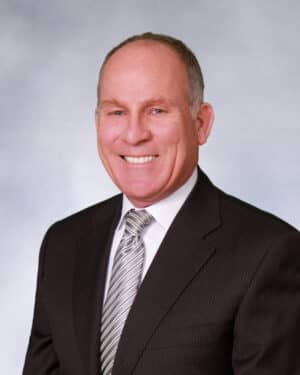Michael R. Wheeler
President and CEO, North Shore Bank
Industry experience: 30 years
Age: 54
North Shore Bank has a new president and chief executive officer. Michael Wheeler is succeeding Kevin M. Tierney Sr., who will be transitioning to the role of executive chairman after a decade as CEO. Wheeler arrived at North Shore Bank in 2019 as president after the last bank he led, Beverly Bank, merged with the bank that is headquartered in Peabody.
Wheeler takes the reins at one of the financial institutions that’s emerging as a winner from consolidation pressures buffeting community banks, including tough competition for deposits and loans. North Shore Bank will be betting on its physical footprint as well as the people it employs, Wheeler says. North Shore Bank itself joined the Hometown Financial Group in 2024, a $6.6 billion multibank mutual holding company headquartered in Easthampton.
Q: Community banks face a lot of pressure to consolidate these days – North Shore Bank itself joined Hometown Financial Group last year. How has your bank been able to be successful in this environment?
A: I think one of the one of the great things about Hometown Financial Group is that we’re able to keep our community identity. Each one of the banks is able to keep its community identity. The shared-service model, which allows us to be much more efficient and run more similarly, like a larger community bank at $6.5 billion or $7 billion in assets. I think consolidation is fast and fierce, but I think competition is also fast and fierce. Everybody’s always chasing the same assets or the same deposit, and working under the shared-service model, Hometown Financial Group has allowed us the capacity to really utilize efficiencies from marketing to retail to lending amongst the three family banks, Hometown Bank and Easthampton bank and North Shore Bank. It’s just been a very productive process for us.
Q: What’s the differentiating factor between someone deciding to bank with one of the larger institutions, or a digital bank, compared to having an account with a local community bank?
A: Digital banks spend a ton of money on advertising. They don’t have brick and mortar. What digital banks lack is that community participation, that community support. Community banks do a really great job of focusing in on what’s impactful to the areas we serve. There‘s always going to be competition from the national banks and from the fintech banks, but I do believe that with the evolution of community banking and utilizing some of that technology and diversifying delivery channels, we will continue to be successful and grow.
I think growth – really I refer to it as smart growth – growing for the sake of growing is not how community banks make bottom-line numbers. Smart growth and doing the right things is how community banks survive and thrive and how they’re able to invest back into their communities. They’re able to invest back into technology. Mergers and acquisitions are going to continue to happen. As it gets more difficult to make money for banks, I think that’s always an exit strategy. There is a lot of succession planning going on. They’re not making as many bankers as they had in the past and I think banks are going to continue to focus on that mergers and acquisition portion for succession planning, as much as it is for growth.
Size is becoming more important as banking in general continues to evolve, and I think most banks understand that, and a lot of banks are looking for the right partner. They‘re looking for the right opportunity to be able to continue to survive and be impactful in their communities. I think North Shore Bank has done a really good job at identifying that early on and being able to leverage that in our growth.
Q: How do you engage younger generations in banking, whether it’s looking to add customers or provide financial literacy, but also get people interested in being that next generation of bankers?
A: We bring on high school students – usually seniors through college students, probably six to eight interns during the summertime – and we expose them to different areas in the bank. I really think banking has become less desirable because it‘s lesser-known. I think the exposure that we‘re able to give to students, they come in and actually see and they understand the community within the bank and digest the desire to be in banking.
Our local bankers association has a great credit analyst training program. They have management training programs. I think banks utilize those to be able to develop talent pools from within the organization and allow that to evolve into more senior positions or harder to recruit positions like credit analysts or portfolio managers or on the retail side, branch managers, assistant branch managers.
Finding the right people with the right personality to be able to do those jobs is just as much of a challenge as it is find the people with the right background to fulfill those jobs. We are using a homegrown model internally. We use our associations to help train the individuals, along with recruiting, which is done both at the bank level and the enterprise level for key positions.
Q: Especially being a community bank, just how important is it – and how difficult can it be – to attract talent?
A: I think it’s unbelievably important. We at North Shore and at [Hometown Financial Group] in general, we talk about making sure we just don’t put a body in a seat. We make sure that we have the right individuals and the right personalities within the bank. We try to manage the efficiency through our employees being our biggest and most important asset to make sure that they’re happy, they’re productive. When they’re happy and productive, the rest of the organization becomes happy and productive, and managing that behavior, or making sure the right individuals are in those positions with the right personalities, is very important. I can’t emphasize that enough. I’ve seen a few times where organizations have put the wrong people in the wrong positions, and next thing you know, you have quite a few people quitting and going elsewhere because of that, because they didn’t match or they didn’t make sure they could work coherently together, and we are very keen on that.
Wheeler’s Five Favorite New England Places
- North Conway, NH
- Lincoln, NH
- Old Orchard Beach, ME
- Boston, MA
- Chatham, MA







